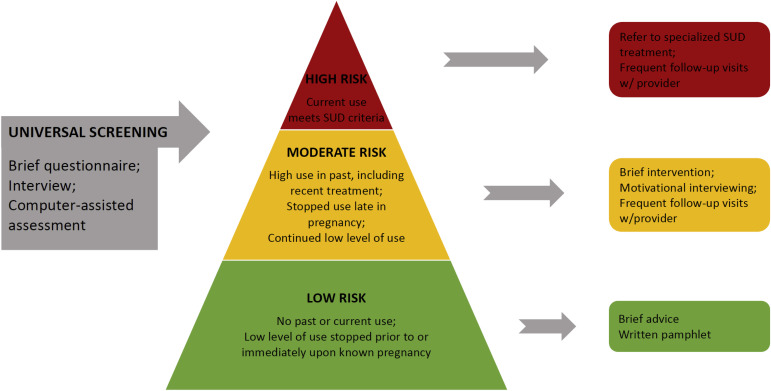What is SBIRT?

SBIRT is an easy to learn evidence-based practice that is based on Motivational Interviewing principles and identifies those individuals who may be using alcohol or illicit drugs/prescription medications in ways that are harmful to their health. The SBIRT approach supports people who are at-risk through the process of making healthy lifestyle changes related to their alcohol and/or illicit drug use.
Many healthcare providers are using SBIRT because risky alcohol and substance use is a public health problem that affects people of all ages and ethnicities. Research shows SBIRT is an innovative and effective way to integrate management of substance use disorders. Patients receiving SBIRT have demonstrated significant reductions in substance use (Babor, Del Boca, & Bray, 2017).
People who received SBI from their physician experienced 20% fewer ED visits,33% fewer nonfatal injuries, 37% fewer hospitalizations, 46% fewer arrests and 50% fewer motor vehicle crashes.
Solberg, L., Maciosek, M., & Edwards, N. (2008). Primary care intervention to reduce alcohol misuse: Ranking its health impact and cost effectiveness. American Journal of Preventive Medicine, 34(2), 143-152.
Want to see SBIRT in action?
Many times, people go to a healthcare professional for one particular service and their level of alcohol/substance use is not addressed. It is possible that their alcohol/substance use may be influencing some of their health conditions and they may not be aware. For this reason, SBIRT is highly flexible and is universal. This means that many different kinds of healthcare professionals may use it with all people who come to them for a service even if the person is not specifically looking for help with unhealthy alcohol or drug use.
- The first step in SBIRT is to quickly screen everyone to find out if the person might be using alcohol/substances at risky or dependent levels. In this way, SBIRT may be used by physicians, nurses, social workers, health educators, paraprofessionals and other types of care providers to help people who may want to make changes.
- SBIRT uses brief, validated, universal pre-screening/screening tools. These short surveys filled out by a patient, quickly and efficiently help professionals talk to a patient about substance use behavior in a sensitive and straight forward way.
- SBIRT is respectful of a person’s process in making behavior changes and sees the patient as the expert on the changes they would like to make in their life, if any. This respect is shown using Motivational Interviewing techniques to help a patient think through the harm that drinking and drug misuse may cause to their health and explore whether behavior change is possible. These Motivational Interviewing skills help the healthcare professional talk to a patient about these sensitive subjects without being pushy or turning the patient off.
- If a patient is screened as being at-risk, a SBIRT trained professional will then use their Motivational Interviewing skills to deliver a brief intervention right after the screening to help the patient. This brief intervention is a 5-15 minute focused conversation between the healthcare professional and patient with the purpose of helping the patient increase his/her insight and awareness about their substance use and supports the patient’s motivation to make behavior changes.
- For people who are found to have more severe substance use problems and need more intensive services, SBIRT provides referral to specialty treatment. Healthcare professionals trained in SBIRT seek to support and guide these people to access the right kind of treatment and care for their substance abuse behaviors, if the patient wants this specialty treatment.

Brief Intervention

Brief Treatment

Referral to Treatment
When the screening results indicate moderate risk a brief intervention is provided.
This motivational intervention involves raising awareness with the individual regarding substance use and consequences.
A successful intervention supports the individual to make behavioral changes.
When an individual is identified as moderate to high risk, a brief treatment is provided.
Similar to the brief intervention, this includes a motivational discussion that empowers the individual to make changes in their life.
Brief treatment also includes a comprehensive assessment, education, problem solving, coping mechanisms, and building a supportive environment.
If the screenig reveals severe risk or dependency, a referral to treatment is provided.
Referral to treatment is a practice step which promotes access to care for individuals requiring additional treatment beyond the scope of SBIRT.
The referral to treament is a pivotal step in the SBIRT process which allows access to care for those who were screened and were identified to be at severe risk or dependent on substance use.
